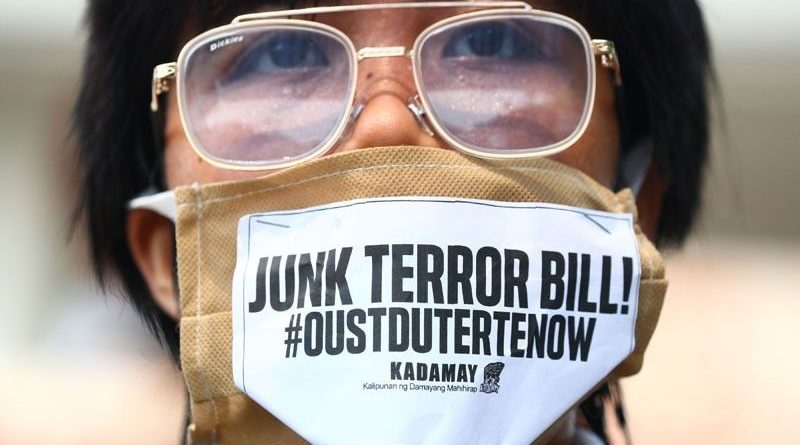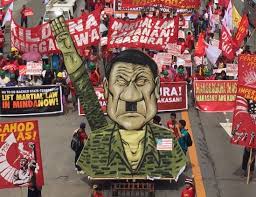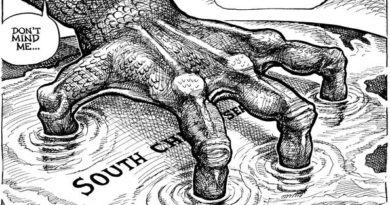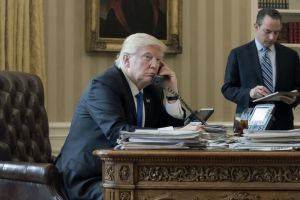DU30’S CRONIES WAR VS OLIGARCHS: MANILA- Carpio, Morales file 11th case vs terror law
They argue that the ATA or Republic Act 11479 should be declared unconstitutional because it gives the Anti-Terrorism Council (ATC) powers greater than those of the president of the republic.- Michael Varcas, file
MANILA, Philippines — Retired Supreme Court senior associate justice Antonio Carpio and former ombudsman Conchita Carpio-Morales have joined the petitioners against the Anti-Terrorism Act of 2020, electronically filing the 11th case against the ATA before the SC yesterday.
They argue that the ATA or Republic Act 11479 should be declared unconstitutional because it gives the Anti-Terrorism Council (ATC) powers greater than those of the president of the republic.
Carpio and Morales will physically file today, when the SC resumes operations, their 86-page petition for certiorari and prohibition under Rule 65 of the Rules of Court, with urgent prayer for a status quo ante order and/or temporary restraining order (TRO) or a writ of preliminary injunction.
They are questioning the Section 45 of the ATA on the creation of the ATC, which has reportedly been given integral powers to order the warrantless arrest of “suspected” terrorists. They say this is invalid because it infringes on the basic principle of separation of powers.
For them, it also gives powers that even far exceed those constitutionally granted to the President as commander-in-chief.
“The power to suspend the writ of habeas corpus is specifically lodged with the President. This makes the inclusion of Section 29 of the ATA an undue delegation of the powers of the President unto the ATC. This is unconstitutional because the powers set forth in Article VII, Section 18 of the Constitution are exercisable only by the Chief Executive as Commander-in-Chief,” the petitioners said.
The President has the power to suspend the writ of habeas corpus for not more than 60 days, provided there is an invasion or rebellion and that public safety requires it. During this time, any person arrested or detained shall be judicially charged within three days, otherwise he or she shall be released.
In Section 29 of the ATA, however, the ATC is authorized to order the warrantless arrests and detentions of suspected terrorists for 14 days, extendible to 24 days.
The petitioners also argued that the ATA is vague and its overreach represses free speech.
They also found contradictory the definitions of “terrorism” and its variants in the ATA.
In Sections 3 (h) and 25, in relation to Section 35 of the ATA, for a person designated by the ATC as a “terrorist” or a member of a “terrorist” organization, the ATC could request the Anti-Money Laundering Council (AMLC) to look into the bank records of the person without a judicial search warrant. This, the petitioners said, violates Article III, Sections 2 and 3 of the Constitution.


Section 36 permits the AMLC and the ATC to issue an “ex parte order to freeze” which amounts to unlawful search and seizure and a deprivation of property without due process of law.
In their prayer, Carpio and Morales asked the SC to conduct a special raffle because of the urgency of the matter and the imminent deprivation of life, liberty and property faced by the petitioners, and to issue a TRO or status quo ante order to restrain the effectivity and implementation of the ATA.
After giving due course to the petition, they asked the SC magistrates to hold oral arguments to determine the merits of the multiple arguments against the constitutionality of the ATA.
They also appealed to the justices to declare the entire ATA null and void as unconstitutional or declare Sections 3(a), 3(b), 3(g), 3(h), 3(i), 3(k), 3(m), 4, 5-12, 16, 25-27, 29-30, 34-36, 45-46 and 49 null and void as unconstitutional.
The petitioners clarified that while they are one with the government’s quest to stamp out and prevent terrorism, they question the unconstitutional means by which it intends to attain peace, security and public order in the country.
“Lest it be misunderstood, the petitioners abhor terrorism and recognize the need to prevent terrorism at its source. However, the petitioners challenge the ATA as a brazen act overreached by the State at the expense of fundamental rights. Its transgressions are so massive that they permeate almost all of its key provisions, running roughshod over such cherished freedoms as free speech, due process, presumption of innocence, right to assembly, right against unreasonable searches and warrantless arrests and right to bail, among others,” the petitioners said.


“The ATA’s cavalier disregard of constitutional liberties in the name of ‘security’ – promoted through fear endangered by the threat of penal sanctions – is a clear evidence that the statute falls far short of the required standard of pursuing the least restrictive means or carving a narrowly tailored law to achieve the government’s goal,” they added.
Carpio and Morales’ co-petitioners are former Magdalo party-list representative Francisco Ashley Acedillo, University of the Philippines associate dean and Institute for Maritime Affairs and Law of the Sea director Jay Batongbacal; UP Law professors Dante Gatmaytan and Theodore Te, UP Law senior professorial lecturers Victoria Loanzon and Anthony Charlemagne Yu, UP Diliman School of Statistics student Tierone James Santos and an incumbent councilor of the UP Student Council.
Named respondents in the petition are the ATC, Executive Secretary and ATC chairman Salvador Medialdea; National Security Adviser and ATC vice chairman Hermogenes Esperon Jr. and ATC members Foreign Affairs Secretary Teodoro Locsin Jr., Defense Secretary Delfin Lorenzana, Interior Secretary Eduardo Año, Finance Secretary Carlos Dominguez III, Justice Secretary Menardo Guevarra, Information and Communications Technology Secretary Gregorio Honasan II and AMLC executive director Mel Georgie Racela.


Gov’t fast-tracking IRR
Meanwhile, Año said the administration is moving to fast-track the crafting of the implementing rules and regulations (IRR) of the anti-terrorism law, which became effective last week.
The Department of the Interior and Local Government (DILG) chief said they want to release the IRR of RA 11479 as soon as possible so as to avoid questions once it is implemented on the ground.
“But there is no restriction in implementing the law because it is already effective,” he said in a pre-SONA briefing.
The law would be used if there are major terror threats monitored, according to Año.
“If the lives of the citizens are at stake, we have to implement. If there is no major terrorist threat, we can wait for the IRR,” he said.
Lorenzana echoed Año’s sentiment, saying the government would not hesitate to use the law without the IRR if there is a terror threat. “If there is no major terrorist threat, we can wait for the IRR. But if there is a terroristic action now, we will use it,” he said.
While it would be prudent to wait for the IRR for state agents, Año said the law could still be applied by the government as it is already effective.
“IRR is not a requirement for the implementation of the law. There is already jurisprudence on that,” he said, noting that there is an SC decision that states that laws are effective 15 days from official publication.


Physical protests
Militant groups said the anti-terror law would not prevent them from pushing through with their planned physical protests during Duterte’s fifth State of the Nation Address (SONA) on Monday.
Bagong Alyansang Makabayan (Bayan) secretary-general Renato Reyes said the SONA rally is expected to be held along Commonwealth Avenue, in front of the Commission on Human Rights, which is symbolic of the human rights crisis being faced by the nation.
The program will be from 10 a.m. to noon., shorter than the usual SONA protests, according to Reyes.
“There’s always that risk, but I don’t think that’s going to dissuade anyone at this point from coming out and expressing themselves. There will be a huge political fallout if ever the administration uses the terror law against the protesters on Monday. That would definitely backfire on the Duterte regime,” he said in an interview over ANC.
He added that they would be vigilant since the government always says that it will not use the terror law against critics of the administration. — Romina Cabrera, Rhodina Villanueva













